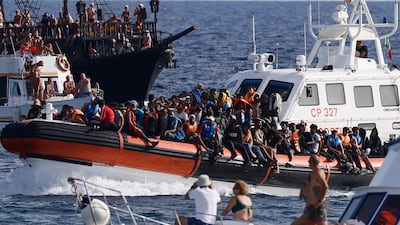Italian Prime Minister Giorgia Meloni has formally complained to German Chancellor Olaf Scholz about Berlin's funding of charities that support migrants in her country, according to a letter made public on Monday.
Amid a debate across Europe about how to manage arrivals, Italy has seen a surge in migrant boat landings on the island of Lampedusa this month.
Although the central Mediterranean is the world's deadliest sea crossing for migrants, Ms Meloni's government has sought to limit the activities of charity rescue ships operating in the area.
“I learnt with amazement that your government, without co-ordinating with the Italian government, decided to provide significant funds to non-governmental organisations working to welcome irregular migrants on Italian territory and in rescues in the Mediterranean Sea,” Ms Meloni wrote.
In the letter dated Saturday, the Italian far-right leader suggested on-land help would be better conducted in Germany than Italy.
She repeated her accusation – strongly denied by NGOs – that charity rescue boats acted as a “pull factor” for migrants crossing the sea from North Africa.
She said it would be better for EU nations wanting to help Italy manage irregular migration to focus on “structural solutions”, including working with transit countries to stop the flows.
Italy migrant boat tragedy – in pictures
Italy's Defence Minister Guido Crosetto said this weekend that NGOs only pick up about 5 per cent of migrants arriving in Italian waters, which so far this year number more than 133,000 – almost double that of the same period last year.
The German foreign office confirmed to AFP on Friday it was providing between €400,000 ($423,000) and €800,000 each to two projects relating to migrants.
The projects were “for the support on land in Italy of people rescued at sea and an NGO project for sea-rescue operations”, a representative said.
The news sparked anger among Matteo Salvini's anti-immigration League party, which shares power with Ms Meloni's far-right Brothers of Italy.
Mr Crosetto also weighed in, saying it was a “very serious” move that put Italy “in difficulty”.
The criticism comes after Berlin temporarily stopped accepting migrants living in Italy, after Rome suspended EU rules governing the distribution of migrants.
Germany slashes aid budget for refugees
Germany plans to halve the federal aid it allocates for states to cover expenses of receiving and integrating refugees next year as part of budget-tightening amid soaring inflation after years of generous spending, sources told Reuters on Monday.
More than one million people sought refuge in Germany after Moscow's invasion of Ukraine and supporting them has taken a toll on the country's cities and municipalities. The country's 16 states have been demanding more federal funds to cover refugees' expenses next year.
On Monday, Berlin informed the states in a meeting that it would allocate a maximum of €1.7 billion ($1.8 billion) to support refugees' expenses in 2024, down from €3.75 billion this year, said two government sources who declined to be named due to the confidentiality of the meeting.
The federal government did not promise that it would match 2023 funding in the following years.
A representative for the Finance Ministry said a meeting of the federal and states' governments on Monday on the issues had yielded no results ahead of a planned consultation with the Chancellor in November.
“Essentially, the states are responsible for the accommodation and care of refugees. The federal government is aware of the national dimension,” the representative added.
The government will eliminate its contribution to the costs of caring for and integrating Ukrainian refugees as well, the sources added.










